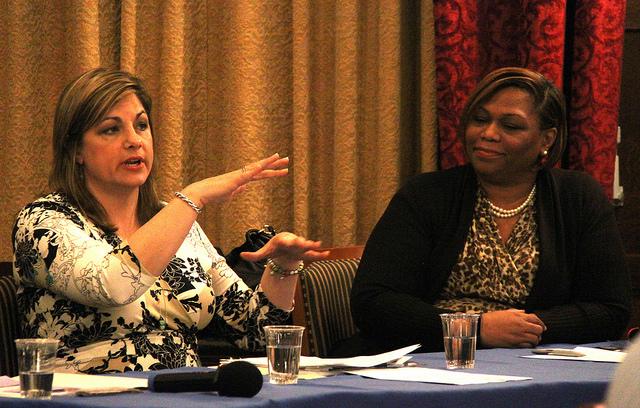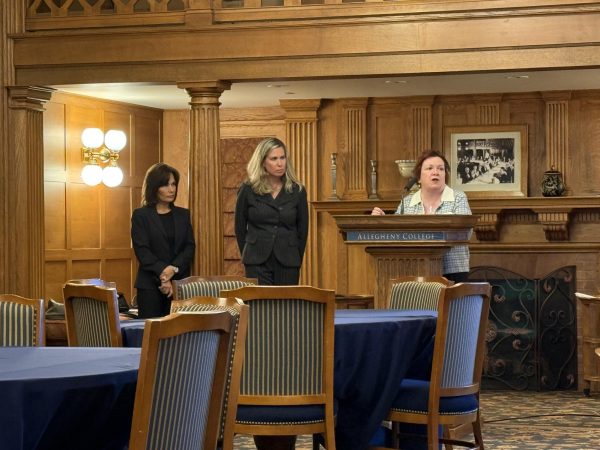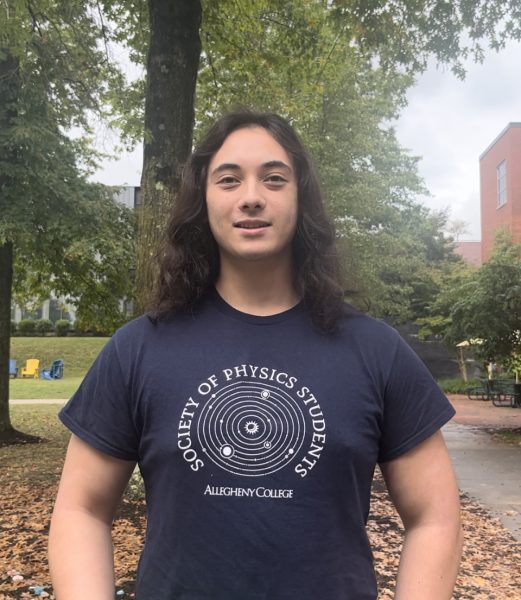College screens controversial documentary
Panel discusses sexual assault on campuses
Title IX Coordinator Gilly Ford and Dean of Students Kimberly Ferguson sat on a panel on Tuesday, April 19, 2016, that discussed sexual assault on college campuses following the screening of “The Hunting Ground.”
The Center for Political Participation, Allegheny Student Government and the Title IX office hosted a screening of the documentary “The Hunting Ground” on Tuesday, April 19 in conjunction with Sexual Assault Awareness Month. The film, which documents the ongoing issue of sexual assault on college campuses in the United States, was followed by a panel discussion.
The panel was comprised of seven members including the Executive Director of Women’s Services Bruce Harlan, District Attorney Francis Schultz, Allegheny College Title IX Coordinator Gilly Ford and Detective Sergeant Mike Steffanucci from the Meadville City Police Department.
Allegheny College President James Mullen was also in attendance and said the program was an important part of the college’s ongoing conversation about sexual assault.
“It’s not easy to watch a movie where I see young people suffering and in pain, victimized. That’s a horrific thing to watch,” Mullen said. “I watched it tonight as a college president, I watched it as a father and I found it hard to watch at all levels.”
Mullen said he hopes the film will inspire the college community to further intensify its efforts to end sexual assault on campus.
Allegheny College is currently under investigation by the U.S. Department of Education’s Office of Civil Rights for its handling of sexual assault cases. In 2014, the college reported a total of 12 “forcible sex offenses,” according to the college’s Clery Report—a federally mandated report of all crimes committed at an institution. Of the 12, nine occurred on college-owned property.
Over the last two academic years seven students have been expelled for violating the college’s sexual misconduct policy, and 10 students have been suspended, according to Director of Student Conduct and Development Joe Hall.
During the panel, Ford explained the OCR does not have the resources to deal with the number of cases it is receiving, so the investigation could take up to two and a half years before it is complete.
Mullen feels the college is addressing the issue of sexual assault but admitted there is more that can be done.
“I think there is always more that an institution can do. Everyone is working very hard to create the kind of programming in our community that fights this horrific disrespect for human dignity,” Mullen said.

Members of the panel stressed the importance of sexual assault education as key to reducing the numbers of assaults. Interim Director of Safety and Security Sean Kennedy, another member of the panel, said a large part of what he has been doing is teaching his officers how to deal with those reporting sexual assaults.
“It’s educating them how to empathize with that person, first and foremost,” Kennedy said
When a sexual assault is reported, the first thing Ford wants to do is ensure the survivor is in a safe place where they feel comfortable.
“Once they are in a place where they feel safe, we want them to reach out to a [resident adviser] or other residence life professional,” Ford said.
Once an RA has been contacted, Ford said the next step is to encourage them to report the incident to the Office of Safety and Security and/or the Meadville Police “if necessary.” She also said encouraging them to seek counseling services is an important step.
Survivors and witnesses of sexual assault should not feel as if they are alone. Harlan encouraged people to take advantage of the resources that are available in the area.
“You have a lot going for you here so no one should feel afraid to come forward,” Harlan said.
In addition to education, removing the stigma that is often connected with sexual assault is another way to ensure that survivors feel comfortable coming forward Harlan said.
“We have to reduce and eliminate the shame factor,” Harlan said. “Why should a rape victim be made to feel as if they did something dishonorable?”
Dean of Students Kimberly Ferguson, who was also on the panel, said the way people are educated about sexaul assault also has to change. The issue is far more complex than some education methods address, she said.

“The ‘no means no’ model doesn’t work anymore,” Ferguson said. “We need to move to the enthusiastic ‘yes’ model.”
Ferguson also stressed the importance of preserving evidence in cases of sexual assault, even if the survivor does not wish to move forward with reporting the incident. She said it is better to preserve the evidence and make a decision later.
“We want to encourage all students to document their incident,” Ferguson said. “It becomes a lot harder to move forward if you don’t preserve evidence.”
As the DA, Schultz said the most challenging part of any sexual assault case is that survivors do not always come forward right away. This means that evidence is lost and the case becomes far more difficult to try.
“We believe the victims…but we need evidence to prove it,” Schultz said.
A prompt complaint can also make it easier in terms of a police investigation, Steffanucci said. He said the more time that lapses between the incident and the police interrogation, the less likely it becomes that the perpetrator will confess to the crime.
Schultz understands it is difficult to report these types of crimes, but stressed how important it is for survivors to come forward.
“It can be hard, it can be tough, but the only way we can hold people accountable is if we have a victim who is strong enough to come forward quick,” Schultz said.
Once a complaint is filed with the Title IX Office, Ford said one of two investigators on staff conduct an investigation. Hall and Gretchen Beck, interim associate dean of students, are the two investigators at the college.
Ferguson said given the size of Allegheny’s campus, it is possible for a student to know one or both parties of a sexual assault investigation. She asked students to support their friend or family member, but also to be mindful of the other party.
“Publicly I am asking you to respect both parties, because the only people who know what happened in that room for sure are those people,” Ferguson said.
Denis Johnson, chief medical officer of the Meadville Medical Center, said sexual assault exams are available at the center at no cost and are confidential. She said the center also works to ensure that its employees are sensitive to the survivor’s needs.
“We do training so that we are appropriate when we are working with victims,” Johnson said.






